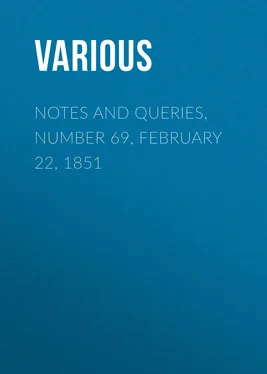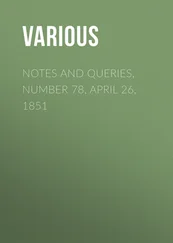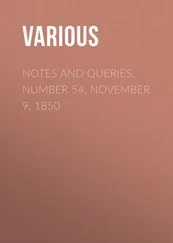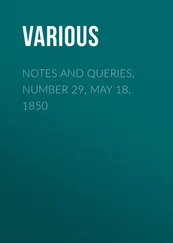Various - Notes and Queries, Number 69, February 22, 1851
Здесь есть возможность читать онлайн «Various - Notes and Queries, Number 69, February 22, 1851» — ознакомительный отрывок электронной книги совершенно бесплатно, а после прочтения отрывка купить полную версию. В некоторых случаях можно слушать аудио, скачать через торрент в формате fb2 и присутствует краткое содержание. Жанр: foreign_antique, periodic, foreign_edu, на английском языке. Описание произведения, (предисловие) а так же отзывы посетителей доступны на портале библиотеки ЛибКат.
- Название:Notes and Queries, Number 69, February 22, 1851
- Автор:
- Жанр:
- Год:неизвестен
- ISBN:нет данных
- Рейтинг книги:4 / 5. Голосов: 1
-
Избранное:Добавить в избранное
- Отзывы:
-
Ваша оценка:
- 80
- 1
- 2
- 3
- 4
- 5
Notes and Queries, Number 69, February 22, 1851: краткое содержание, описание и аннотация
Предлагаем к чтению аннотацию, описание, краткое содержание или предисловие (зависит от того, что написал сам автор книги «Notes and Queries, Number 69, February 22, 1851»). Если вы не нашли необходимую информацию о книге — напишите в комментариях, мы постараемся отыскать её.
Notes and Queries, Number 69, February 22, 1851 — читать онлайн ознакомительный отрывок
Ниже представлен текст книги, разбитый по страницам. Система сохранения места последней прочитанной страницы, позволяет с удобством читать онлайн бесплатно книгу «Notes and Queries, Number 69, February 22, 1851», без необходимости каждый раз заново искать на чём Вы остановились. Поставьте закладку, и сможете в любой момент перейти на страницу, на которой закончили чтение.
Интервал:
Закладка:
Barlaam and Josaphat was translated into almost every European dialect during the Middle Age, sometimes in verse, but usually in prose, and became an admired folk-book. Among the versions lately recovered I may mention one into Old-Swedish (a shorter one, published in my Old-Swedish Legendarium , and a longer one, not yet published); and one in Old-Norwegian, from a vellum MS. of the thirteenth century, shortly to appear in Christiania.
George Stephens.Stockholm.
Parallel Passages. —Under "Parallel Passages" (Vol. ii., p. 263.) there occur in two paragraphs—" There is an acre sown with royal seed, " concluding with " living like gods, to die like men, " from Jeremy Taylor's Holy Dying ; and from Francis Beaumont—
"Here's an acre sown indeed
With the richest royalest seed.
. . . . . .
Though gods they were, as men they died."
Which of these twain borrowed the "royal seed" from the other, is a manner of little moment; but the correspondence of living as gods, and dying as men, both undoubtedly taken from Holy Scripture; the phrase occurring in either Testament: "I have said, Ye are gods … But ye shall die like men" (Psalm lxxxii. 6, 7.); quoted by our Saviour (John, x. 34.): "Jesus answered them, Is it not written in your law, I said, Ye are Gods?"
J. G. M.Hallamshire.
Cause of Rarity of William IV.'s Copper Coinage. —The copper coinage of William IV. is become so scarce, that possibly a doubt may some day arise, whether any but a very limited issue of it was ever made; it may be well, therefore, to introduce a note on the cause of its disappearance, while the subject is comparatively recent.
When the copper coins of the last reign appeared, a slight tinge in the colour of the metal excited the suspicion of those accustomed to examine such things, that it contained gold, which proved to be the fact; hence their real value was greater than that for which they passed current, and they were speedily collected and melted down by manufacturers, principally, I believe, as an alloy to gold, whereby every particle of that metal which they contained was turned to account. I have been told that various Birmingham establishments had agents in different parts of the country, appointed to collect this coinage.
R. C. H.Burnet. —In the list of conflicting judgments on Burnet, quoted by your correspondents (Vol. i., pp. 40. 120. 181. 341. 493.), I find no reference to the opinion of his contemporary, Bishop Nicolson. That writer takes a somewhat partial view of the character and merits of the historian, and canvasses, by anticipation, much of what has been urged against him by our more modern critics. But, as the weight of authorities already cited appears to militate against Burnet, I am induced to send you some of Bishop Nicolson's remarks, for the sake of those readers who may not have immediate access to them. I quote from his English Historical Library , 2nd edition, p. 119.:
"In the months of December and January in the year following (1680), the historian (G. Burnet) had the thanks of both Houses of Parliament for what he had already done; and was desired to proceed to the finishing of the whole work, which was done accordingly. This historian gives a punctual account of all the affairs of the Reformation, from its first beginning in the reign of Henry VIII., till it was finally completed and settled by Queen Elizabeth, A.D. 1559. And the whole is penned in such a masculine style as becomes an historian, and such as is this author's property in all his writings. The collection of records which he gives in the conclusion of each volume are good vouchers of the truth of all he delivers (as such) in the body of his history; and are much more perfect than could reasonably be expected, after the pains taken, in Queen Mary's days, to suppress everything that carried the marks of the Reformation upon it. The work has had so much justice done it, as to meet with a general acceptance abroad, and to be translated into most of the European languages; insomuch that even the most piquant of the author's enemies allow it to have a reputation firmly and deservedly established . Indeed, some of the French writers have cavilled at it; but the most eminent of them (M. Varillas and M. Le Grand) have received due correction from the author himself."
Henry H. Breen.St. Lucia, Dec. 1850.
Coleridge's Opinion of Defoe. —Wilson, in his Memoirs of the life and Times of Defoe , vol. ii. p. 205., having quoted the opinion of the Editor of Cadell's edition of Robinson Crusoe ,—"that Defoe wanted many of those qualities, both of mind and manner, which fitted Steele and Addison to be the inimitable arbitri elegantiarum of English society, there can be no doubt,"—Coleridge wrote in the margin of his copy, "I doubt this, particularly in respect to Addison, and think I could select from Defoe's writings a volume equal in size to Addison's collected papers, little inferior in wit and humour, and greatly superior in vigor of style and thought."
Ts.Miller's "Philosophy of Modern History." —In the memoir, chiefly autobiographical, prefixed to the last edition (published by Mr. Bohn, 1848-9) of this most able and interesting work, we find the following words, p. xxxv.:
"In the preceding period of my lecturing, I collected a moderate audience [seldom exceeding ten persons] in the Law School [his friend, Alexander Knox, being always one], sufficient to encourage me, or at least to permit me, to persevere, but not to animate my exertions by publicity. But as I was approaching the sixteenth century, the number of my hearers increased so much, that I was encouraged to remove to the Examination Hall, from which time my lectures attracted a large portion of public attention, strangers forming a considerable portion of the auditory."
It is worthy of remark, in connexion with this production of a highly-gifted scholar and divine, whose name does honour to Trinity College, Dublin, that Dr. Sullivan's Lectures on the Constitution and Laws of England , which have since deservedly acquired so much fame, were delivered in presence of only three individuals, Dr. Michael Kearney and two others—surely no great encouragement to Irish genius! In fact, the Irish long seemed unconscious of the merits of two considerable works by sons of their own university,—Hamilton's Conic Sections and Sullivan's Lectures ; and hesitated to praise, until the incense of fame arose to one from the literary altars of Cambridge, and an English judge, Sir William Blackstone, authorised the other.
In the memoir to which I have referred, we find a complete list of the many publications which Dr. Miller, "distinguished for his services in theology and literature," sent forth from the press. We are likewise informed that there are some unpublished letters from Hannah More, Alexander Knox, and other distinguished characters, with whom Dr. Miller was in the habit of corresponding.
Abhba.Anticipations of Modern Ideas or Inventions. —In Vol. iii., pp. 62. 69., are two interesting instances of this sort. In Wilson's Life of Defoe , he gives the titles of two works which I have often sought in vain, and which he classes amongst the writings of that voluminous author. They run thus:
" Augusta triumphans , or the way to make London the most flourishing city in the universe. I. By establishing a university where gentlemen may have an academical education under the eye of their friends [ the London University anticipated ]. II. To prevent much murder, &c., by an hospital for foundlings. III. By suppressing pretended madhouses, where many of the fair sex are unjustly confin'd while their husbands keep mistresses, and many widows are lock'd up for the sake of their jointures. IV. To save our youth from destruction by suppressing gaming tables, and Sunday debauches. V. To avoid the expensive importation of foreign musicians by promoting an academy of our own, [ Anticipation of the Royal Academy of Music ], &c. &c. London: T. Warner. 1728. 8vo."
Читать дальшеИнтервал:
Закладка:
Похожие книги на «Notes and Queries, Number 69, February 22, 1851»
Представляем Вашему вниманию похожие книги на «Notes and Queries, Number 69, February 22, 1851» списком для выбора. Мы отобрали схожую по названию и смыслу литературу в надежде предоставить читателям больше вариантов отыскать новые, интересные, ещё непрочитанные произведения.
Обсуждение, отзывы о книге «Notes and Queries, Number 69, February 22, 1851» и просто собственные мнения читателей. Оставьте ваши комментарии, напишите, что Вы думаете о произведении, его смысле или главных героях. Укажите что конкретно понравилось, а что нет, и почему Вы так считаете.












